- Home
- J. M. Barrie
When a Man's Single: A Tale of Literary Life Page 2
When a Man's Single: A Tale of Literary Life Read online
Page 2
CHAPTER II
ROB BECOMES FREE
As Haggart hobbled down into the square, in the mole-catcher's rear,Hobart's cracked bell tinkled up the back-wynd, and immediatelyafterwards the bellman took his stand by the side of Tam Peter'sfish-cart. Snecky gave his audience time to gather, for not every daywas it given to him to cry a lost bairn. The words fell slowly from hisreluctant lips. Before he flung back his head and ejected hisproclamation in a series of puffs he was the possessor of exclusivenews, but his tongue had hardly ceased to roll round the concludingsentence when the crowd took up the cry themselves. Wives flinging opentheir windows shouted their fears across the wynds. Davy Dundas hadwandered from the kirkyard, where Rob had left her in Kitty Wilkie'scharge till he returned from the woods. What had Kitty been about? Itwas believed that the litlin had taken with her a letter that had comefor Rob. Was Rob back from the woods yet? Ay, he had scoured the wholecountryside already for her.
Men gathered on the saw-mill brig, looking perplexedly at the burn thatswivelled at this point, a sawdust colour, between wooden boards; butthe women pressed their bairns closely to their wrappers and gazed ineach other's face.
A log of wood, with which some one had sought to improvise a firebetween the bricks that narrowed Rob Angus's grate, turned peevishly tocharcoal without casting much light on the men and women in the saw-millkitchen. Already the burn had been searched near the mill, with Rob'swhite face staring at the searchers from his door.
The room was small and close. A closet-bed with the door off affordedseats for several persons; and Davit Lunan, the tinsmith, who could readHomer with Rob in the original, sat clumsily on the dresser. Thependulum of a wag-at-the-wa' clock swung silently against the wall,casting a mouse-like shadow on the hearth. Over the mantelpiece was asampler in many colours, the work of Rob's mother when she was still amaid. The bookcase, fitted into a recess that had once held a press, wasRob's own handiwork, and contained more books than any other house inThrums. Overhead the thick wooden rafters were crossed with saws andstaves.
There was a painful silence in the gloomy room. Snecky Hobart tried tobreak the log in the fireplace, using his leg as a poker, but desistedwhen he saw every eye turned on him. A glitter of sparks shot up thechimney, and the starling in the window began to whistle. Pete Toddlooked undecidedly at the minister, and, lifting a sack, flung it overthe bird's cage, as if anticipating the worst. In Thrums they veil theircages if there is a death in the house.
'What do ye mean, Pete Todd?' cried Rob Angus fiercely.
His voice broke, but he seized the sack and cast it on the floor. Thestarling, however, whistled no more.
Looking as if he could strike Pete Todd, Rob stood in the centre of hiskitchen, a saw-miller for the last time. Though they did not know it,his neighbours there were photographing him in their minds, and theirchildren were destined to gape in the days to come over descriptions ofRob Angus in corduroys.
These pictures showed a broad-shouldered man of twenty-six, whose facewas already rugged. A short brown beard hid the heavy chin, and the lipswere locked as if Rob feared to show that he was anxious about thechild. His clear grey eyes were younger-looking than his forehead, andthe swollen balls beneath them suggested a student rather than a workingman. His hands were too tanned and hard ever to be white, and he delveda little in his walk, as if he felt uncomfortable without a weight onhis back. He was the best saw-miller in his county, but his ambitionwould have scared his customers had he not kept it to himself. Many atime strangers had stared at him as he strode along the Whunny road, andwondered what made this stalwart man whirl the axe that he had beenusing as a staff. Then Rob was thinking of the man he was going to bewhen he could safely leave little Davy behind him, and it was not thefirs of the Whunny wood that were in his eye, but a roaring city and asaw-miller taking it by the throat. There had been a time when he boreno love for the bairn who came between him and his career.
Rob was so tall that he could stand erect in but few rooms in Thrums,and long afterwards, when very different doors opened to him, he stillinvoluntarily ducked, as he crossed a threshold, to save his head. Up tothe day on which Davy wandered from home he had never lifted his hat toa lady; when he did that the influence of Thrums would be broken forever.
'It's oncommon foolish o' Rob,' said Pete Todd, retreating to the sideof the mole-catcher, 'no to be mair resigned-like.'
'It's his ind'pendence,' answered Jamie; 'ay, the wricht was sayin' thenoo, says he, "If Davy's deid, Rob'll mak the coffin 'imsel, he's saemichty ind'pendent."'
Tammas Haggart stumbled into the saw-miller's kitchen. It would havebeen a womanish kind of thing to fling-to the door behind him.
'Fine growin' day, Rob,' he said deliberately.
'It is so, Tammas,' answered the saw-miller hospitably, for Haggart hadbeen his father's bosom friend.
'No much drowth, I'm thinkin',' said Hobart, relieved by the turn theconversation had taken.
Tammas pulled from beneath the table an unsteady three-leggedstool--Davy's stool--and sat down on it slowly. Rob took a step neareras if to ask him to sit somewhere else, and then turned away his head.
'Ay, ay,' said Haggart.
Then, as he saw the others gathering round the minister at the door, hemoved uneasily on his stool.
'Whaur's Davy?' he said.
'Did ye no ken she was lost?' the saw-miller asked, in a voice that washardly his own.
'Ay, I kent,' said Tammas; 'she's on the Whunny road.'
Rob had been talking to the minister in what both thought English, whichin Thrums is considered an ostentatious language, but he turned onTammas in broad Scotch. In the years to come, when he could wear gloveswithout concealing his hands in his pockets, excitement brought onScotch as a poultice raises blisters.
'Tammas Haggart,' he cried, pulling the stone-breaker off his stool.
The minister interposed.
'Tell us what you know at once, Tammas,' said Mr. Dishart, who, out ofthe pulpit, had still a heart.
It was a sad tale that Haggart had to tell, if a short one, and severalof the listeners shook their heads as they heard it.
'I meant to turn the lassieky,' the stone-breaker explained, 'but, ou,she was past in a twinklin'.'
On the saw-mill brig the minister quickly organised a search party, thebrig that Rob had floored anew but the week before, rising daily withthe sun to do it, because the child's little boot had caught in a wornboard. From it she had often crooned to watch the dank mill-wheelclimbing the bouncing burn. Ah, Rob, the rotten old planks would haveserved your turn.
'The Whunny road' were the words passed from mouth to mouth, and thedriblet of men fell into line.
Impetuous is youth, and the minister was not perhaps greatly to blamefor starting at once. But Lang Tammas, his chief elder, paused on thethreshold.
'The Lord giveth,' he said solemnly, taking off his hat and letting thenight air cut through his white hair, 'and the Lord taketh away: blessedbe the name of the Lord.'
The saw-miller opened his mouth, but no words came.
The little search party took the cold Whunny road. The day had beenbright and fine, and still there was a smell of flowers in the air. Thefickle flowers! They had clustered round Davy and nestled on her neckwhen she drew the half-ashamed saw-miller through the bleating meadows,and now they could smile on him when he came alone--all except thedaisies. The daisies, that cannot play a child false, had craned theirnecks to call Davy back as she tripped over them, and bowed their heavylittle heads as she toddled on. It was from them that the bairn's trackwas learned after she wandered from the Whunny road.
By and by the hills ceased to echo their wailing response to Hobart'sbell.
Far in the rear of the more eager searchers, the bellman and the joinerhad found a seat on a mossy bank, and others, footsore and weary, hadfallen elsewhere from the ranks. The minister and half a dozen othersscattered over the fields and on the hillsides, despondent, but notdaring to lag. Tinkers cowered roun
d their kettles under threateningbanks, and the squirrels were shadows gliding from tree to tree.
At a distant smithy a fitful light still winked to the wind, but thefarm lamps were out and all the land was hushed. It was now long pastmidnight in country parts.
Rob Angus was young and strong, but the heaven-sent gift of tears wasnot for him. Blessed the moaning mother by the cradle of hereldest-born, and the maid in tears for the lover who went out so bravein the morning and was not at evenfall, and the weeping sister who canpray for her soldier brother, and the wife on her husband's bosom.
Some of his neighbours had thought it unmanly when Rob, at the rumble ofa cart, hurried from the saw-mill to snatch the child in his arms, andbear her to a bed of shavings. At such a time Davy would lift a saw towithin an inch of her baby face, and then, letting it fall with a wickedchuckle, run to the saw-miller's arms, as sure of her lover as evermaiden was of man.
A bashful lover he had been, shy, not of Davy but of what men would say,and now the time had come when he looked wistfully back to a feveredchild tossing in a dark bed, the time when a light burned all night inRob's kitchen, and a trembling, heavy-eyed man sat motionless on ahigh-backed chair. How noiselessly he approached the bonny mite andreplaced the arm that had wandered from beneath the coverlet! Ah, forthe old time when a sick imperious child told her uncle to lie downbeside her, and Rob sat on the bed, looking shamefacedly at theminister. Mr. Dishart had turned away his head. Such things are not tobe told. They are between a man and his God.
Far up the Whunny hill they found Davy's little shoe. Rob took it in hishand, a muddy, draggled shoe that had been a pretty thing when he put iton her foot that morning. The others gathered austerely around him, andstrong Rob stood still among the brackens.
'I'm dootin' she's deid,' said Tammas Haggart.
Haggart looked into the face of old Rob's son, and then a strange andbeautiful thing happened. To the wizened stone-breaker it was no longerthe sombre Whunny hill that lay before him. Two barefooted herd-laddieswere on the green fields of adjoining farms. The moon looking over thehills found them on their ragged backs, with the cows munching by theirside. They had grown different boys, nor known why, among the wild rosesof red and white, and trampling neck-high among the ferns. Haggart sawonce again the raspberry bushes they had stripped together into flagonsgleaming in the grass. Rob had provided the bent pin with which Tammaslured his first trout to land, and Tammas in return had invited him tothraw the neck of a doomed hen. They had wandered hand-in-hand throughthirsty grass, when scythes whistled in the corn-fields, and larkstrilled overhead, and braes were golden with broom.
They are two broad-shouldered men now, and Haggart's back is rounding atthe loom. From his broken window he can see Rob at the saw-mill,whistling as the wheel goes round. It is Saturday night, and they are inthe square, clean and dapper, talking with other gallants about lasses.They are courting the same maid, and she sits on a stool by the door,knitting a stocking, with a lover on each side. They drop in on hermother straining the blaeberry juice through a bag suspended between twochairs. They sheepishly admire while Easie singes a hen; for love of herthey help her father to pit his potatoes; and then, for love of theother, each gives her up. It is a Friday night, and from a but and benaround which the rabble heave and toss, a dozen couples emerge instrangely gay and bright apparel. Rob leads the way with one lass, andTammas follows with another. It must be Rob's wedding-day.
Dim grow Tammas's eyes on the Whunny hill. The years whirl by, andalready he sees a grumpy gravedigger go out to dig Rob's grave. Alas!for the flash into the past that sorrow gives. As he clutches youngRob's hand the light dies from Tammas's eyes, his back grows round andbent, and the hair is silvered that lay in tousled locks on a lad'shead.
A nipping wind cut the search party and fled down the hill that waschanging in colour from black to grey. The searchers might have beensmugglers laden with whisky bladders, such as haunted the mountain inbygone days. Far away at Thrums mothers still wrung their hands forDavy, but the men slept.
Heads were bared, and the minister raised his voice in prayer. One ofthe psalms of David trembled in the grey of the morning straight toheaven; and then two young men, glancing at Mr. Dishart, raised aloft afallen rowan-tree, to let it fall as it listed. It fell pointingstraight down the hill, and the search party took that direction; allbut Rob, who stood motionless, with the shoe in his hand. He did notseem to comprehend the minister's beckoning.
Haggart took him by the arm.
'Rob, man, Rob Angus,' he said, 'she was but fower year auld.'
The stone-breaker unbuttoned his trouser pocket, and with an unsteadyhand drew out his snuff-mull. Rob tried to take it, but his armtrembled, and the mull fell among the heather.
'Keep yourselves from idols,' said Lang Tammas sternly.
But the minister was young, and children lisped his name at the whitemanse among the trees at home. He took the shoe from the saw-miller whohad once been independent, and they went down the hill together.
Davy lay dead at the edge of the burn that gurgles on to the saw-mill,one little foot washed by the stream. The Whunny had rocked her to sleepfor the last time. Half covered with grass, her baby-fist still clutchedthe letter. When Rob saw her, he took his darling dead bairn in his armsand faced the others with cracking jaws.
'I dinna ken,' said Tammas Haggart, after a pause, 'but what it's kindo' nat'ral.'

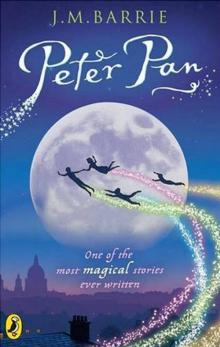 Peter Pan
Peter Pan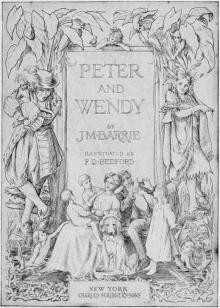 Peter and Wendy
Peter and Wendy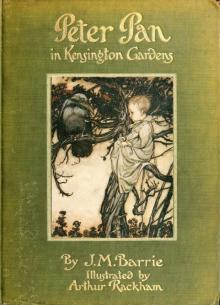 Peter Pan in Kensington Gardens
Peter Pan in Kensington Gardens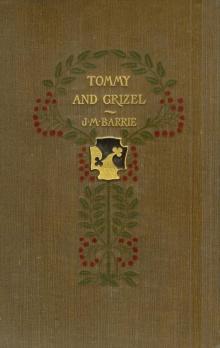 Tommy and Grizel
Tommy and Grizel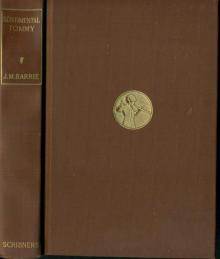 Sentimental Tommy
Sentimental Tommy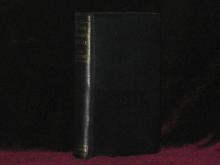 When a Man's Single: A Tale of Literary Life
When a Man's Single: A Tale of Literary Life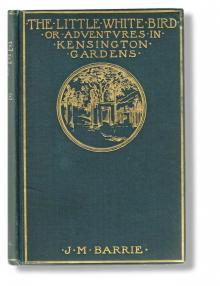 The Little White Bird; Or, Adventures in Kensington Gardens
The Little White Bird; Or, Adventures in Kensington Gardens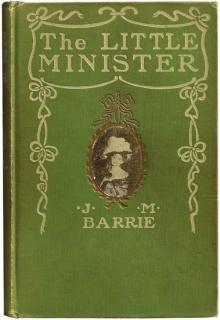 The Little Minister
The Little Minister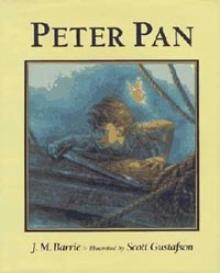 Peter Pan (peter pan)
Peter Pan (peter pan)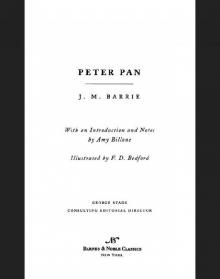 Peter Pan (Barnes & Noble Classics Series)
Peter Pan (Barnes & Noble Classics Series)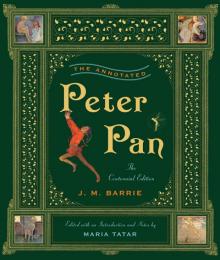 The Annotated Peter Pan (The Centennial Edition) (The Annotated Books)
The Annotated Peter Pan (The Centennial Edition) (The Annotated Books)